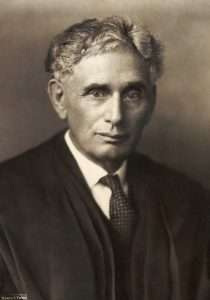The Volokh Conspiracy
Mostly law professors | Sometimes contrarian | Often libertarian | Always independent
Today in Supreme Court History: January 28, 1916
1/28/1916: President Wilson nominates Louis Brandeis to the Supreme Court. He would be confirmed on June 1, 1916.

Editor's Note: We invite comments and request that they be civil and on-topic. We do not moderate or assume any responsibility for comments, which are owned by the readers who post them. Comments do not represent the views of Reason.com or Reason Foundation. We reserve the right to delete any comment for any reason at any time. Comments may only be edited within 5 minutes of posting. Report abuses.
Please to post comments


The first Jewish Justice, at the time of the nomination GOP Senator Henry Cabot Lodge privately complained, "If it were not that Brandeis is a Jew, and a German Jew, he would never have been appointed[.]"
The more things change...
OK, he was a Jew. He brought diversity to the ethnic make up of the Court. Did his appointment make any difference to the awful output of this garbage branch of government? What became different in its output?
Brandeis was a real Volokh. Harvard Law school at 18, and it was too slow for him. Not enough law to discuss for his taste. The Brandeis Brief introduced the innovation of relying on non legal expert testimony. I admit that was an advance into reality for the profession.
There were 125 days between Brandeis' nomination and confirmation vote. For comparison, the same wait periods for the previous ten Supreme Court nominees (all confirmed) had been 10, 23, 3, 3, 0, 7, 7, 9, 4, and 2 days. And this was a Democrat nominee and a Democrat Senate.
The Brandeis nomination marks the beginning of the modern Senate practice of conducting committee hearings to review judicial nominees. The Brandeis nomination was controversial for two reasons. First, he was the first Jewish nominee (this was just naked anti-Semitism at play, though it cuts against Woodrow Wilson's reputation as an inveterate racist). Second, his legal background was different than the typical nominee. Brandeis, sometimes termed the "first public-interest lawyer" had gotten very wealthy in private practice by suing corporations. This was considered somewhat lowly, seedy work, not respectable "white shoe" practice. This made him a lot of enemies. After all, a respectable attorney defended corporations; he didn't sue them.
The 125 days remains the longest period between nomination and confirmation vote. (Of course, some nominees waited longer, never receiving a vote at all). The second-longest period was the 114 days for President Reagan's nomination of Robert Bork, who was rejected by the Senate, though unlike the Brandeis case, the Presidency and the Senate were controlled by opposing parties. The second-longest delay when the same party controlled the Presidency and the Senate was Reagan's nomination of Associate Justice William Rehnquist for Chief Justice (89 days), followed closely by the recent nomination of Brett Kavanaugh by President Trump (88 days).
I enjoy your historical notes, F.D. A good deal more enlightening than the posts.
Thank you. I imagine that makes one of you.
I should add that perhaps Brandeis might have taken a more “respectable” career path, but the “white shoe” firms, like so many “respectable” institutions of the day, tended to exclude Jews.
At least two, I enjoy them also. I think another factor in the controversy you didn't mention was that conservatives considered him an anti-corporate radical. Which he certainly had been, up to that point. W.H. Taft also loudly opposed him, apparently for personal reasons. The two had tangled in the past, and had publicly said some very uncollegial things about each other. I think they buried the hatchet when they eventually served together on the court.
"it cuts against Woodrow Wilson's reputation as an inveterate racist"
Well, Jefferson Davis had Judah P. Benjamin as a close advisor in the Civil War. Would Davis therefore be less "inveterate" in his racism?
Even most people we would label as racists are complicated people, not cartoon figure. There's a sense people have that every racist is basically Hitler, but like everything else in life, there are degrees and exceptions and just general inconsistencies and weirdness.
I was recently reading about Justice McReynolds, perhaps the biggest bigot ever to sit on the Supreme Court. And he used to do egregious stuff like turn his chair around when the NAACP's lawyer was advocating, and make sexist comments whenever a woman would argue.
But when he became the Senior Associate Justice, he would sometimes act as the Chief when the Chief Justice was recused. And in those cases, perhaps because of the difference in his role, apparently he behaved completely differently, being exceedingly polite to everyone including the women and minority advocates.
That's often how these things worked. Nixon could say enormously anti-Semitic things but also probably trusted Henry Kissinger more than any other person on foreign policy issues. People are complicated, and racists are complicated too.
Perfectly true!
The narrower point to which I was alluding is that there were people who were anti-black and pro-equality for Jews. Davis and Wilson being examples, but hardly the only ones.
I think that is clearly true of Wilson. He also befriended and respected Paul Warburg, and appointed him to the Federal Reserve.
That's not quite right. His was the first public confirmation hearing. (And, I believe, the first where witnesses were called.) They had committee meetings to consider nominees before him, but they were just the proverbial smoke filled rooms in which senators met to discuss.